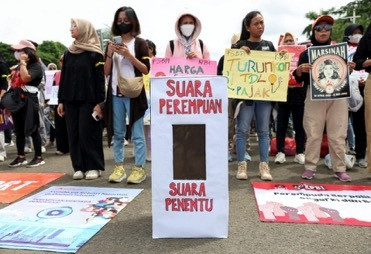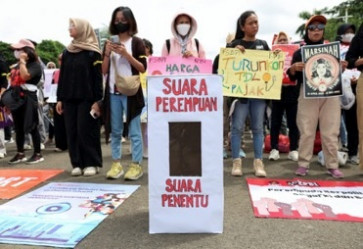Popular Reads
Top Results
Can't find what you're looking for?
View all search resultsPopular Reads
Top Results
Can't find what you're looking for?
View all search resultsReflection on women’s fight for equality in Indonesian politics
Protecting women in politics is not just about ensuring equality; it is essential for the future of Indonesia’s democracy.
Change text size
Gift Premium Articles
to Anyone
W
ith Indonesia’s 2024 presidential, legislative and regional elections behind us, attention now shifts to the new administration under President Prabowo Subianto. These elections showcased the resilience of Indonesia’s democratic spirit but also revealed ongoing challenges for women in politics, particularly the alarming rise of online violence that demands immediate attention.
As the world observes the 16 Days of Activism against Gender-Based Violence from Nov. 25 to Dec. 10, it is crucial to reflect on these issues and consider how Indonesia’s new government can champion meaningful reforms. Protecting women in politics is not just about ensuring equality; it is essential for the future of Indonesia’s democracy.
A Nov. 28 report by The Jakarta Post, citing statements from United Nations Women Indonesia, highlighted how gender-based violence (GBV) remains a neglected issue globally as well as in Indonesia. According to UN Women, this neglect is evident in the limited attention for violence against women (VAW) compared to other pressing issues like climate change. Yet, the cost of inaction is enormous: the World Bank estimates that GBV costs some countries between 1.2 percent and 3.7 percent, or even higher, of their gross domestic product.
In Indonesia, the numbers of VAW in politics are staggering. Data from 2019 to 2023 by Komnas Perempuan show a fluctuating, and worrying, pattern of violence in public and state realms. In 2022, violence in public spaces peaked at 4,182 cases, while state realms cases surged to 188, marking the highest levels in five years. By contrast, 2023 saw a significant drop, with 1,276 cases in public/community spaces and 68 cases in state realms. While this might seem like progress, “a few leaves on the surface of a deep-rooted tree” might be a suitable metaphor as many cases go unreported.
Reports in the state realm, which includes VAW in roles such as politicians, journalists and other public officials, reflects how systemic barriers persist in spaces meant to uphold law and order. A notable incident involved Hasyim Asy’ari, the former head of Indonesia’s General Elections Commission (KPU), who was dismissed in July for sexually harassing a subordinate, according to the Association for Elections and Democracy.
The increase in cases in 2022 coincides with heightened political activities leading up to the 2024 elections, further emphasizing women’s vulnerability in these contexts.
The digital sphere adds another layer of complexity. Women in politics are targeted not only by structural barriers but also by relentless digital harassment. This year, several cases highlighted this troubling trend. An Indonesian Solidarity Party (PSI) candidate in Depok, West Java, faced sexist remarks on social media, turning her campaign tagline, "Siap Memimpin Depok" (SEMOK), into objectifying comments. In East Nusa Tenggara (NTT), a NasDem candidate withdrew after an explicit video allegedly involving her was circulated online. Similarly, a TikTok video featuring a Regional Representatives Council (DPD) candidate from East Java went viral, with voters commenting sexist remarks about her physical appearance, rather than her qualifications. This showed us that female candidates often face character assassination through online gender-based violence (KBGO), with false accusations and past scandals fabricated to damage their reputation and electoral chances.



















